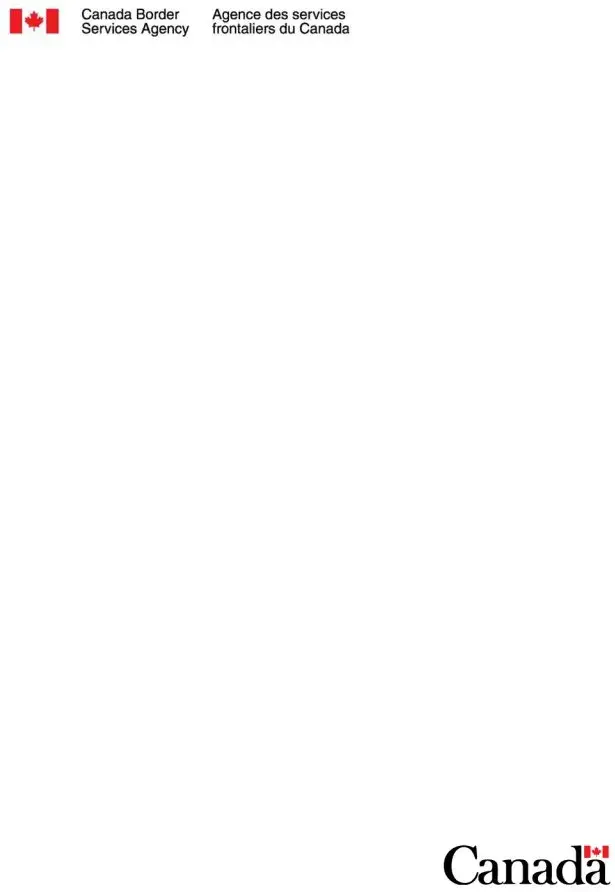The ENF 6 form, a critical component of Canada's immigration framework, serves as a comprehensive guide for reviewing reports under subsection A44(2). This document outlines the procedures, policies, and legal considerations that must be adhered to when assessing individuals' admissibility to Canada. It underscores the importance of procedural fairness and sets forth specific protocols for dealing with minors or individuals unable to understand the nature of the proceedings. With sections devoted to interpreting the Immigration and Refugee Protection Act (IRPA) and its regulations, the ENF 6 lays down the foundation for addressing cases of inadmissibility, emphasizing the roles of the Minister’s Delegate in the review process. It includes detailed procedures for evidentiary requirements, the burden of proof, and the standard of proof, along with the duty of the involved parties to provide necessary information. The scope of discretion available to the Minister’s Delegate is carefully outlined, highlighting the limited options and the prioritization of cases involving security, human or international rights violations, serious criminality, and organized criminality. Additionally, the form offers guidance on handling personal circumstances, considerations for protected persons, and Charter rights. New amendments and updates ensure the form reflects the current legislative environment, enhancing clarity, ensuring the consistent application of IRPA provisions, and acknowledging recent court decisions. Furthermore, the document addresses specific procedures for issuing removal orders, considerations for temporary resident permits, and processes for claims of refugee protection, making it an indispensable tool for navigating the complexities of Canada's immigration law.
| Question | Answer |
|---|---|
| Form Name | Enf 6 Form |
| Form Length | 60 pages |
| Fillable? | No |
| Fillable fields | 0 |
| Avg. time to fill out | 15 min |
| Other names | enf, cbsa, a44 1, 2014 |

ENF 6
Review of reports under subsection A44(2)
ENF 6 Review of reports under subsection 44(2)
Contents
1 What this chapter is about |
6 |
||
2 Program objectives |
6 |
||
3 The Act and Regulations |
6 |
||
5 Definitions |
11 |
||
6 Departmental policy |
12 |
||
6.1 |
Procedural fairness |
12 |
|
6.2 |
Procedures for persons less than 18 years old or persons unable to appreciate the nature |
||
of the proceedings |
13 |
||
6.3 |
Official languages |
14 |
|
6.4 |
Interpreters |
14 |
|
6.5 |
Counsel |
14 |
|
7 Procedure: Review of the A44(1) report by the Minister’s Delegate |
15 |
||
7.1 |
Transmission of an A44(1) report to the Minister’s Delegate |
15 |
|
7.2 |
Reviewing the A44(1) report |
16 |
|
7.3 |
Procedure: Evidentiary requirements |
17 |
|
7.4 |
Burden of proof |
17 |
|
7.5 |
Standard of Proof |
18 |
|
7.6 |
Duty to provide information |
19 |
|
8 Scope of Discretion of the Minister’s Delegate |
20 |
||
8.1 |
Minister’s Delegate Options— Limited discretion of the MD at A44(2) |
20 |
|
8.2 |
Priority Cases: Inadmissibility under A34, A35, A36 and A37 of the IRPA |
22 |
|
8.3 |
Personal circumstances |
22 |
|
8.4 |
Special considerations for protected persons |
22 |
|
9 Charter considerations |
23 |
||
10 Cases where the MD has jurisdiction to issue a removal order |
25 |
||
10.1 |
Procedural fairness considerations |
25 |
|
10.2 Types of administrative removal orders |
25 |
||
10.3 |
Permanent residents and their residency obligation— R228(2) |
26 |
|
10.4 |
Removal order for refugee claimants— R228(3) |
27 |
|
10.5 |
Dual intent |
28 |
|
10.6 |
Restoration of status |
29 |
|
10.7 |
Procedure: Reviewing A44(1) reports when a Minister’s Delegate is not on site |
31 |
|
10.8 |
Procedure: Issuing removal orders to persons in absentia |
31 |
|
10.9 |
A44(1) reports for inadmissible family members |
34 |
|
10.10 Procedure: Removal orders following vacation or cessation of refugee/protected person
status by RPD |
35 |
||
11 Temporary resident permits (TRPs) |
35 |
||
12 |
Allowing withdrawal of application to enter Canada/ Allowed to leave (Port of entry cases) .37 |
||
13 |
Procedure: Handling possible claims for refugee protection |
37 |
|
14 |
Persons claiming to be Canadian citizens or registered Indians under the Indian Act |
38 |
|
15 |
Cases where the jurisdiction to issue a removal order rests with the Immigration Division .. |
39 |
|
15.1 |
A44(1) reports concerning foreign nationals |
39 |
|
15.2 |
A44(1) reports concerning permanent residents of Canada |
39 |
|
15.3 |
Loss of appeal right cases |
40 |
|
15.4 |
Considerations for |
41 |
|
15.5 |
A44(1) reports for criminality cases |
41 |
|
15.6 |
Preparation of warning letter |
42 |
|
16 |
Adjourning Proceedings |
43 |
|
|
|
|
2 |
|
|||
ENF 6 Review of reports under subsection 44(2)
17 |
Procedure: Entry for the purpose of further examination or an admissibility hearing (Port of |
|
||
|
entry officers) |
43 |
||
18 |
Imposition of Conditions following the A44(1) report for A34: Mandatory circumstances |
44 |
||
19 |
Procedure: Directing persons back to the United States under R41 |
45 |
||
20 |
Appeals and Judicial Review— Removal Order |
46 |
||
20.1 Appeals to the Immigration Appeal Division |
46 |
|||
20.2 Right to file an application for leave and judicial review— Where no statutory right of |
|
|||
appeal exists |
47 |
|||
21 |
Reports with multiple allegations |
48 |
||
22 |
Entering MD decisions into GCMS |
48 |
||
24 |
Offences under the Youth Criminal Justice Act |
48 |
||
Appendix A: Noteworthy provisions of the IRPA |
50 |
|||
Appendix B: Table: Immigration and Refugee Protection Act (IRPA) Inadmissible Classes |
52 |
|||
Appendix C: Sample Warning letter |
55 |
|||
Appendix D: Steps for |
|
|||
|
removal order |
56 |
||
Appendix E: Case Law on the Scope of Discretion under A44 |
58 |
|||
Appendix I: |
Sample letter— |
IAD appeal acknowledgement letter |
59 |
|
Appendix J: |
Sample letter— |
Judicial Review Acknowledgement letter |
60 |
|
3
ENF 6 Review of reports under subsection 44(2)
Updates to chapter
Listing by date:
Substantive and minor changes, as well as clarifications, have been provided throughout the chapter.
New content has been added to reflect legislative and regulatory amendments and to ensure consistent application of IRPA provisions as clarified through new court decisions.
Sections have been
Section 3.1: Amended to include several new or updated forms.
Section 9: New section added to provide guidance on Charter considerations.
Section 10.9: Content added to reflect amendments to IRPA provisions regarding inadmissible family members under section A42.
Section 10.10: Content added to reflect new inadmissibility section A40.1 Cessation of refugee
protection: under R228(1)(b.1) the MD has the authority to issue removal orders to foreign nationals who are found inadmissible under A40.1(1) on a final determination by the RPD under A108(2) that the refugee protection of the foreign national has ceased.
Section 18: New section added to reflect changes to IRPA and IRPR requiring that decision- makers impose prescribed conditions on security (A34) inadmissibility cases.
Date:
Section 5.1: Substantial changes were made throughout that section.
Section 5.7: Minor changes were made to the first paragraph. As well, two paragraphs were added.
Section 7: The entire section was
Section 9: Minor changes were made.
Section 19.2: The section on
Section 20.1: The entire section was
Changes were made to reflect the transition from CIC to the CBSA. The term “delegated officer” was replaced with “Minister’s delegate” throughout text; references to “departmental policy” were eliminated; references to CIC and CBSA officers and to the C&I Minister and the PSEP Minister were made where appropriate, as were other minor changes.
Appendix A was removed since no countries are listed under A102(1);
Appendix B, C & D were renamed A, B & C;
Other minor changes to correct mistakes or relating to terminology were also made.
ENF 6 - Review of Reports under A44(1) has been updated to reflect an amendment to paragraph R228. The amendment prescribes that inadmissibility reports with respect to unaccompanied minors and persons unable to appreciate the nature of proceedings who
4
ENF 6 Review of reports under subsection 44(2)
are unaccompanied must be referred to the Immigration Division if the Minister's delegate determines that a removal order should be sought.
The title for section 23 of chapter ENF 6 in French has been amended and now reads as follows:
Statut de citoyenneté/Citoyens canadiens qui présentent une demande d'asile
A minor change was made to section 3.8 and section 24 of ENF 6.
Changes to section 3.3 and the addition of section 24 relate to the procedures to follow when issuing administrative removal orders on grounds of misrepresentation pursuant to R228(1)(b).
5
ENF 6 Review of reports under subsection 44(2)
1 What this chapter is about
This chapter provides guidance to Canada Border Services Agency (CBSA) and Immigration, Refugees and Citizenship Canada (IRCC) officials performing the function of the Minister’s Delegate (MD) and exercising their authority to review reports prepared under A44(1) of the Immigration and Refugee Protection Act (IRPA).
2 Program objectives
The objectives of Canadian immigration legislation with regard to the inadmissibility provisions are:
to protect the health and safety of Canadians and to maintain the security of Canadian society;
to promote international justice and security by fostering respect for human rights and denying access to Canadian territory to persons, including refugee claimants, who are criminals or security risks.
3 The Act and Regulations
Under A44(1), an officer may prepare and transmit a report if that officer is of the opinion that a permanent resident or foreign national in Canada is inadmissible. Under A44(2), all A44(1) reports must be referred to the MD to determine the accuracy and validity of the report and to decide whether to:
issue a removal order, where the MD has jurisdiction to do so; or
refer the matter to the Immigration Division (ID) of the Immigration and Refugee Board (IRB) for an admissibility hearing.
The IRPA provides authority both to members of the ID and to the MD to issue removal orders, depending on the type of allegation contained in the A44(1) report, and pursuant to the authority prescribed in the IRPA and the Immigration and Refugee Protection Regulations (IRPR) .
In order to streamline the enforcement process in cases involving straightforward allegations, and to maintain the principle that the MD may make determinations in cases where there is little need to weigh evidence, the scheme of the Act and Regulations empowers the MD to issue removal orders under the circumstances prescribed in R228. Generally speaking, the more discretion and analysis required in assessing the allegation, the more likely the jurisdiction rests with a member of the ID.
It is important to note that where the MD is authorized to make removal orders under R228, this authority applies at both ports of entry and at inland offices.
The following table includes some of the most relevant provisions that may apply during the A44(2) process. Some of the authorities listed below pertain specifically to CBSA Border Services Officers (BSOs) at the port of entry or IRCC officers assessing applications; others are more relevant to CBSA Inland Enforcement Officers (IOEs).
6

ENF 6 Review of reports under subsection 44(2)
Table 1: Sections of the IRPA and the IRPR applying to determinations under A44(2)
Provision |
Act and |
|
Regulations |
||
|
||
|
|
|
Delegation of powers |
A6(2) |
|
|
|
|
Permanent Resident |
A21(1) |
|
|
|
|
Temporary resident dual intent |
A22 |
|
|
|
|
|
|
|
Entry to complete examination or hearing |
A23 |
|
|
|
|
|
|
|
Residency obligation |
A28 |
|
|
|
|
Security |
A34 |
|
Human or international rights violations |
A35 |
|
Serious criminality |
A36(1) |
|
Criminality |
A36(2) |
|
Organized criminality |
A37 |
|
Health grounds |
A38 |
|
Financial reasons |
A39 |
|
Misrepresentation |
A40 |
|
Cessation of refugee protection |
A40.1 |
|
A41(a) |
||
A41(b) |
||
Inadmissible family member |
A42 |
|
|
|
|
Preparation of report |
A44(1) |
|
|
|
|
|
|
|
Referral or removal order |
A44(2) |
|
|
|
|
Imposition of Conditions |
A44(3) |
|
|
|
|
Mandatory imposition of conditions— inadmissibility on grounds of |
A44(4),(5) |
|
security |
||
|
||
|
|
|
Applicable removal order- Immigration Division |
A45(d) |
|
|
|
|
|
|
|
No return without prescribed authorization |
A52(1) |
|
|
|
|
Right of appeal to Immigration Appeal Division (IAD) |
A63 |
|
|
|
|
Loss of appeal rights |
A64 |
|
|
|
|
Application for judicial review |
A72(1) |
|
|
|
|
Protected person |
A95 |
|
|
|
|
Referral to Refugee Protection Division |
A100(1) |
|
|
|
|
Suspension of consideration of eligibility of claim |
A100(2) |
|
|
|
|
|
|
|
Deemed referral to Refugee Protection Division |
A100(3) |
|
|
|
|
Ineligibility to refer refugee claim |
A101 |
|
|
|
|
Cessation of refugee protection |
A108 |
|
|
|
|
Vacation of refugee protection |
A109 |
|
|
|
7

ENF 6 Review of reports under subsection 44(2)
A115(1) |
||
|
|
|
Ministerial Opinion for protected person |
A115(2) |
|
|
|
|
Rehabilitation |
R18, R18.1 |
|
|
|
|
Direct back to the United States |
R41(b) |
|
|
|
|
|
|
|
Withdrawing application/Allow to leave |
R42 |
|
|
|
|
Conditions A23 |
R43(1) |
|
|
|
|
Applicable removal order— Minister |
R228 |
|
|
||
Criminality (foreign nationals) |
R228(1)(a) |
|
R228(1)(b) |
||
Misrepresentation (vacation of refugee/protected person status) |
||
R228(1)(b.1) |
||
Misrepresentation (cessation of refugee protection) |
||
R228(1)(c) |
||
Failure to comply |
||
R228(1)(d)(e) |
||
Inadmissible family members |
||
R228(2) |
||
Permanent residents and their residency obligation |
||
R228(3) |
||
Eligible claim for refugee protection |
||
|
||
Unaccompanied minors |
R228(4)(a) |
|
R228(4)(b) |
||
Persons unable to appreciate the nature of proceedings |
||
|
||
|
|
|
Applicable removal order— Immigration Division (ID) |
R229 |
|
|
|
For further information regarding the division of jurisdiction to issue removal orders, see
Appendix B, ‘Table: Immigration and Refugee Protection Act (IRPA) Inadmissible Classes’
3.1 Forms
The following table includes some common forms used in the 44(2) process. This is a non- exhaustive list and some may only apply to officers carrying out the administration of IRPA at the port of entry.
Table 2: Forms
Form title |
Form |
|
number |
||
|
||
|
|
|
Referral under subsection 44(2) of the Immigration and Refugee Protection |
BSF506 |
|
Act for an admissibility hearing |
||
|
||
|
|
|
Denial of Authorization to Return to Canada Pursuant to Subsection 52(1) of |
IMM 1202B |
|
the Immigration and Refugee Protection Act |
|
|
|
|
|
Authorization to Return to Canada Pursuant to Section 52(1) of the |
IMM 1203B |
|
Immigration and Refugee Protection Act |
||
|
||
|
|
|
Departure Order |
IMM 5238B |
|
|
|
|
Exclusion Order |
IMM 1214B |
|
|
|
8

ENF 6 Review of reports under subsection 44(2)
Deportation Order |
BSF581 |
|
|
|
|
Notice to Appear for a Proceeding under Subsection 44(2) |
IMM 1234B |
|
BSF504 |
||
|
||
|
|
|
Notice to client – No Admissibility Hearing |
BSF513 |
|
|
|
|
|
|
|
Subsection A44(1) Highlights – Port of Entry Cases |
BSF516 |
|
|
|
|
Subsection 44(1) and A55 Highlights – Inland Cases |
IMM 5084B |
|
|
|
|
Request for Admissibility Hearing/Detention Review Pursuant to the |
BSF524 |
|
Immigration Division Rules |
||
|
||
|
|
|
Entry for Further Examination or Admissibility Hearing |
BSF536 |
|
|
|
|
Direction to Leave Canada |
BSF503 |
|
|
|
|
Direction to return to the United States |
BSF505 |
|
|
|
|
Notification to the Refugee Protection Division and the Refugee Appeal |
BSF528 |
|
Division and the Person Concerned by an Immigration Officer Pursuant to |
|
|
Subsection 103(1) of the Immigration and Refugee Protection Act of the |
|
|
Suspension of Consideration of Claim |
|
Notification to the Refugee Protection Division and the Person Concerned by BSF527 an Officer Pursuant to Paragraph 103(2) of the Immigration and Refugee Protection Act
|
Notification to the Person Concerned by an Immigration Officer Pursuant to |
|
BSF529 |
|
|
Paragraph 104(1)(A), (B), (C), OR (D) of the Immigration and Refugee |
|
|
|
|
Protection Act & Notification to the Refugee Protection Division pursuant to |
|
|
|
|
Paragraph 104(1) of the same Act |
|
|
|
|
|
|
|
|
|
Acknowledgement of Conditions |
|
IMM1262* |
|
|
|
|
||
|
|
|
BSF 821** |
|
|
|
|
|
|
|
Acknowledgement of Conditions for IRPA Section 34 Cases |
|
BSF798 |
|
|
|
|
|
|
|
|
|
|
|
Notes to File
*currently available in GCMS
** currently available only in CBSA Atlas
BSF788
4 Instruments and delegations
A4 sets out which Minister is responsible for the administration of the IRPA. The Minister of Citizenship and Immigration [also known as Immigration, Refugees and Citizenship Canada (IRCC)] and the Minister of Public Safety and Emergency Preparedness (PS) are jointly responsible for the administration and enforcement of the IRPA, however there are some differences. The IRCC Minister is responsible for the overall administration of the IRPA, unless
9
ENF 6 Review of reports under subsection 44(2)
otherwise specified. The Minister of PS has the primary responsibility for the administration of the IRPA as it relates to the following:
port of entry examinations;
policy lead relating to enforcement of the IRPA including arrest, detention and removal;
establishment of policies respecting the enforcement of the IRPA and inadmissibility under A34/35/37; and
declarations referred to under A42.1 (Ministerial Relief provision)
Pursuant to A6(1), the responsible Minister has the authority to designate specific persons or classes of persons to carry out any purpose of any provision of the IRPA with respect to their individual mandates as described in A4, and to specify the powers and duties of the officers so designated. In addition, A6(2) authorizes that anything that may be done by the Minister under the Act and Regulations may be done by a person that the Minister authorizes in writing. This is referred to as delegation of authority.
A designated authority refers to the position that has been given the legal authority by the Minister to carry out the delegated function.
Each Minister who has responsibilities under the IRPA has written an instrument of delegation and designation that is periodically updated. The Delegation of Authority and Designations of Officers (D & D) instruments stipulate who has the authority to perform specific immigration- related functions. CBSA and IRCC personnel are designated by position to perform all delegated or designated authorities, including those associated with A44(1)/A44(2) functions. It is to be noted that the IRPA D & D instruments have a hierarchical link which means only the lowest level of authority is included in the D & D instruments as every position above this one (with a direct hierarchical link) has the same authority to perform specific
CBSA and IRCC officials acting in the capacity of the MD in A44(2) proceedings should always review both the CBSA and the IRCC D & D instruments as they have authorities delegated and designated under both instruments, which can be found on the IL 3- Designation of Officers and Delegation of Authority.
The authority to review A44(1) reports has been designated to certain CBSA and IRCC officials. It is important to note that while IRCC officers have been designated the authority to review reports for most inadmissibility sections, A44(1) reports for inadmissibility under A34 (security grounds), A35 (grounds of violating human or international rights) and A37 (grounds of organized criminality) may only be prepared and reviewed by CBSA.
All reports written by CBSA or IRCC officers will be reviewed by the MD who has been delegated the authority under the D & D instruments. If the MD is of the opinion that the report is
issue a removal order, if the allegation is within the MD’s authority pursuant to R228; or
refer the report to the ID pursuant to the R229.
10